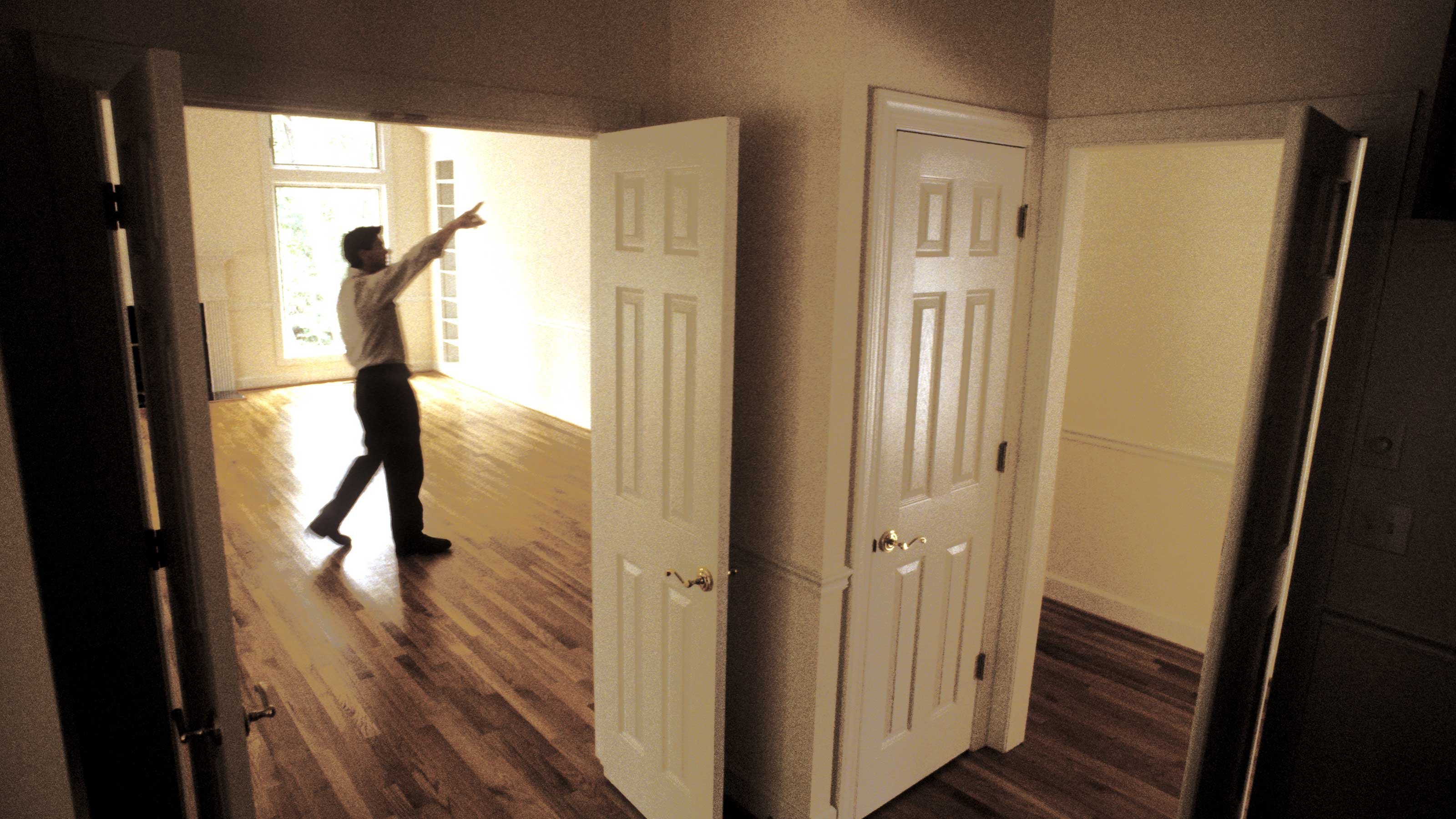Tips to Buy or Sell Your Home in 2019
Kiplinger's real estate expert Pat Mertz Esswein helps home buyers and sellers navigate the current housing market. Also, hosts Sandy Block and Ryan Ermey share which financial habits they're giving up during Lent, as well as play a game of Financial Fact or Fiction.

Profit and prosper with the best of Kiplinger's advice on investing, taxes, retirement, personal finance and much more. Delivered daily. Enter your email in the box and click Sign Me Up.
You are now subscribed
Your newsletter sign-up was successful
Want to add more newsletters?

Delivered daily
Kiplinger Today
Profit and prosper with the best of Kiplinger's advice on investing, taxes, retirement, personal finance and much more delivered daily. Smart money moves start here.

Sent five days a week
Kiplinger A Step Ahead
Get practical help to make better financial decisions in your everyday life, from spending to savings on top deals.

Delivered daily
Kiplinger Closing Bell
Get today's biggest financial and investing headlines delivered to your inbox every day the U.S. stock market is open.

Sent twice a week
Kiplinger Adviser Intel
Financial pros across the country share best practices and fresh tactics to preserve and grow your wealth.

Delivered weekly
Kiplinger Tax Tips
Trim your federal and state tax bills with practical tax-planning and tax-cutting strategies.

Sent twice a week
Kiplinger Retirement Tips
Your twice-a-week guide to planning and enjoying a financially secure and richly rewarding retirement

Sent bimonthly.
Kiplinger Adviser Angle
Insights for advisers, wealth managers and other financial professionals.

Sent twice a week
Kiplinger Investing Weekly
Your twice-a-week roundup of promising stocks, funds, companies and industries you should consider, ones you should avoid, and why.

Sent weekly for six weeks
Kiplinger Invest for Retirement
Your step-by-step six-part series on how to invest for retirement, from devising a successful strategy to exactly which investments to choose.
Ryan: Are you considering selling your home? Buying a new one? Buying your first one? No matter who you are, our real estate expert Pat Mertz Esswein has advice for you in our main segment (see Home Prices Take a Breather). On today's show, Sandy and I find money habits to break during Lent and wrap up with a game of Financial Fact or Fiction. That's all ahead on this episode of Your Money's Worth. Stick around.
- Episode Length: 00:27:43
- Links and resources mentioned in this episode
- SUBSCRIBE: Apple Google Play Spotify Overcast RSS
Ryan: Welcome to Your Money's Worth, I'm Kiplinger Staff Writer Ryan Ermey, joined as always by Senior Editor Sandy Block. Sandy, how are you?
Sandy: Good.
From just $107.88 $24.99 for Kiplinger Personal Finance
Become a smarter, better informed investor. Subscribe from just $107.88 $24.99, plus get up to 4 Special Issues

Sign up for Kiplinger’s Free Newsletters
Profit and prosper with the best of expert advice on investing, taxes, retirement, personal finance and more - straight to your e-mail.
Profit and prosper with the best of expert advice - straight to your e-mail.
Ryan: This goes out on a Monday. Tomorrow is Tuesday, and specifically it is Fat Tuesday-
Sandy: Fat Tuesday.
Ryan: Mardi Gras, which the more religious among us will note is just at the precipice of Lent. I never personally did much Lent growing up. I could always tell it was Lent because everyone in my high school would be crabby for a few weeks. Did you ever do it?
Sandy: Oh yeah. I've given up chocolate. When I used to drink a lot more soft drinks, one year I gave up Coca-Cola, which being somewhat Southern, was a big sacrifice.
Ryan: Oh yeah.
Sandy: I guess my biggest memories of Lent is, there would always be fish in the cafeteria, and in my hometown the fish fry is the place to go on Fridays during Lent.
Ryan: So we thought that we would do our own sort of version of Lent, in terms of something that we're looking to give up. But I'm actually ... In preparing the segment, I'm told that you actually kind of already do something along these lines for Lent.
Sandy: This is something I picked up a few years ago on social media that I think has a lot of value, and particularly right now when everybody's into this whole Marie Kondo, decluttering thing. At the beginning of Lent I put aside a box, and every day during Lent I put something in it to donate. Maybe an article of clothing, a book, something that does not spark joy, that I no longer need.
Ryan: Yeah, that's right.
Sandy: Then at the end, at Easter, I give it to charity. I kind of like this because you're sharing. You're making a modest sacrifice but you're also doing some good, so I think ... Like I said, this is not original to me. A lot of people do it and I just think it sort of is in the spirit of what Lent is about.
Ryan: Do you say thank you to the items before you put them in the box?
Sandy: No, I don't talk to my clothes.
Ryan: I haven't watched the show or read the book, but I'm told that you're supposed to thank-
Sandy: You're supposed to thank ...
Ryan: Each individual item.
Sandy: I don't talk to my clothes, no.
Ryan: And for the tax savvy among us ...
Sandy: If you still itemize you should keep track of these things, because you can claim a deduction for non-cash items, and if you give them to Goodwill or the Salvation Army they will give you a receipt, so there could be a benefit to you, but that's not the reason that you're doing this. You're doing this in the spirit of giving during the Season of Lent.
Ryan: There you go. The thing I'm giving up for Lent isn't really so much a thing to give up. It should be noted that when I was growing up, every friend I knew did Lent, but it was always ... All these Catholic kids, it was like, they'd give up Nintendo 64, but they'd still play PlayStation. It's just rife with loopholes.
Sandy: Yeah, I knew a woman who said she was giving up motorcycle racing, and she didn't own a motorcycle. So yeah, there's lots of loopholes.
Ryan: Right. So I'm endeavoring to give up being nice about my finances. That's not really true. It's about complacency, and I have a tendency, a really terrible habit, to either let sort of money problems kind of skate because I don't want to deal with them, because I don't want to confront people, or to just throw money at a problem so that it will go away. They're both bad habits, and so I've decided no more Mr. Nice Guy for Lent. I'm going to make it a point to be more annoying, to haggle, negotiate, and complain.
Ryan: We have a lot of content about this that I'm going to put into the show notes so that you, too, can be more annoying during this holiday season. A couple of the things that I think top the list is renegotiating my cable bill, which has crept up ... I mean, I think from 90-something-odd dollars to over 150 over the last couple of months.
Sandy: Right. And they just assume inertia.
Ryan: And they assume correctly, because I don't want to get on the phone and argue with Comcast for hours. I keep telling my roommates, because I handle the stuff for the house, I keep telling my roommates that I'll take care of it, I'll take care of it, and then I don't. Luckily, bad roommates that they are, they don't listen to the podcast, so they don't know that they're getting charged a lot more. But I need to do that.
Ryan: Other things that we've talked about before: If you have credit card debt, it's very possible to negotiate a lower interest rate or even like a freeze if you're willing to call them, let them know that you might be considering a balance transfer. Even ... Our bosses absolutely listen to the podcast, but it's worth negotiating and complaining and advocating for yourself in the workplace.
Sandy: Exactly.
Ryan: Whether you're talking about getting a raise, or even negotiating for more benefits, maybe you want Fridays off, or maybe you want more flexible hours, more flexible vacation, these are all things worth bringing up. The common advice across all of these arenas is, be polite, patient, and persistent.
Sandy: And willing to walk.
Ryan: Always willing to walk away. Know when to fold a losing hand. There's only so much you can escalate. You can't get the President of Comcast to expunge your cable bill.
Ryan: The other thing is that you should really know your stuff going into it. If you have say a consumer complaint, you should have your receipts. You should have a paper trail of you emailing their customer service department and asking for this and asking for that. Keep track of when you went to the store to try to return something or whatever. Make sure that you have all your bases covered, you have a leg to stand on. If you're asking for a new salary or whatever at your job, it's worth going on Glassdoor. They have their own issues at the moment, but it's worth going on one of these websites to see what people in comparable positions are getting paid. Just do your homework. Be able to give a presentation to whoever it is, be it your boss or the customer service people, and make your case clearly and patiently.
Sandy: God advice, Ryan.
Ryan: When we come back, Pat Mertz Esswein breaks down the real estate market for buyers and sellers alike. Don't go anywhere.
Ryan: All right, and we're back, and we're here with Associate Editor Pat Mertz Esswein, who not only published the annual housing outlook in the March issue of Kiplinger's, but we thought it would be a good time to have you on, Pat, because spring is the sort of traditional hot season for home-buying and selling. So thank you for coming on, first of all, and what's going on with home prices?
Pat: This year is going to be a little different than last year. It seems as though the housing market is slowing down just a little bit from the several go-go years that we've seen. Inventory overall is increasing a little bit, which is a really great thing, because before this a lot of home-buyers had very little to look at. Home prices will still be increasing, but not as much as last year, and that's a great thing for home buyers, because many of them, especially first-timers, have reached the limits of affordability. So we think the market will be a little more balanced, a little bit calmer, this year.
Ryan: Why don't we start on the sell side. Where does the slowing situation leave people who want to sell their homes?
Pat: It's kind of interesting. People who are selling entry level homes will probably still enjoy a fairly quick sale, because that's where most of the demand is. People who are selling what you might describe as a move-up or a luxury home will probably see that it takes longer to sell their homes. There's not as much demand for them, and in some places they may even have to cut their prices. That's a real shocker for home sellers who've had all the advantage over the past several years.
Sandy: So if I'm interested in selling my home, and I can't assume that people are going to be lining up to buy it, what do I need to do to make sure that I am going to get the price that I'd like?
Pat: Right. Really, regardless of what price tier your home is in, at a minimum you really need to declutter like crazy, and clean it to death. People who come to see your home do not want to see dirt. Or as one recent home buyer said to me, he said he was going to buy a brand new home because he didn't really want to see people's pubes in the bathroom.
Ryan: I think I should.
Pat: So it's better to hide your shampoo bottles than to line them up in order by height on the bathroom counter. Organize your drawers, clean out your closets. If you have a lot of stuff, maybe seasonal stuff, that you don't use every day, or won't use prior to selling the house, then pack it up and stack it neatly in boxes in your garage, or even better maybe, take it all to storage if you can.
Pat: When you actually begin working with a real estate agent, they will advise you on what else you need to do to make your house most appealing to prospective buyers in your area. So don't be doing major repairs or renovations that you don't actually have to do.
Sandy: Dos that go for ... I read a lot in our magazine and elsewhere about staging. Is that something that you should assume you need to do, or wait until a real estate agent tells you whether ... Because that can kind of get expensive, I think.
Pat: Yes. So what you want to do is let the real estate agent advise you about staging. Typically what they will do is provide that service to you. On an entry level home they might have you pay for it, probably out of the funds at closing, that you receive at closing. On a luxury home they probably will provide that service because they're already making mega bucks in their commission and they can afford to do that for you.
Sandy: And I've also heard you're supposed to put away all your pictures, so the people can picture themselves in your house, not you.
Pat: Yes. And peculiar decor, just because you're ... For instance, a really good example is, you may be very proud of your hunting trophies, and maybe you should be, but a lot of buyers will be really-
Sandy: They don't want to see your deer heads, that's right.
Pat: Yeah, they'll be turned off.
Ryan: I have two life-size porcelain sculptures of cheetahs in my home. Would that be a problematic thing?
Pat: I don't know, in some areas that might just be considered neutral decor.
Ryan: I think a lot of people find them charming. Put little Santa hats on them around the holidays.
Pat: You know that lamp from the Christmas story?
Sandy: The leg lamp, yeah.
Ryan: Yeah. It's a major award.
Pat: Right, I'd probably put that away.
Ryan: We think it's sort of broadly speaking more of a buyer's market than last year. Is that accurate?
Pat: Just slightly.
Ryan: Just slightly, but I certainly have a lot of friends, young people who are looking to buy their first home. What's the broad advice for buyers, and specifically, what can first time or young home buyers do to increase their odds here?
Pat: First things first. Some people may be putting off buying a home because they think they need a 20% down payment. That's nice to have, because if you have it then you can avoid the monthly cost of private mortgage insurance, but you don't have to have 20% to buy a house, or to get a mortgage. You can get in with just 3%, or 3.5%, of the purchase price as a down payment. That's something to keep in mind.
Pat: Another good thing is to get preapproved for your mortgage, so that when you make an offer on a home, the home seller is convinced that you can close on that deal. They want to know that you can get a mortgage, and they don't want to waste time on somebody who ultimately can't. Those are a couple of good things to do.
Sandy: A lot of young people are used to doing all of their business online. Is it still worthwhile to actually get a real estate act if you're in the market for a first time home?
Pat: Yes. Most people do begin searching for a home online, and that's a great way to get a sense of what's out there and what's available and how much is available, but it's not the be-all to end-all, and chances are you probably won't buy the house that you've been drooling over on a website. So I think it is important to hire a real estate agent, especially for first timers who may not really understand the process of buying a home, who probably need some guidance and some handholding just to allay that anxiety that goes along with a first-time home purchase. Plus, real estate agents, in a market where there's still relatively little to look at, a real estate agent may become aware of properties that would be suitable for you to look at before they even are shown on a website.
Sandy: And what should you look for in a real estate agent?
Pat: It's probably a really good thing to look for a real estate agent who helps a lot of first-time home buyers. They'll understand what your issues may be and the level of anxiety that you may have. When you signing a contract with a real estate agent it's important that you are hiring this agent as your buyer's agent, and it's even possible to find real estate agents who do business as exclusive buyers' agents. They represent buyers only, they never list homes for sale, so there's no potential conflict of interest.
Ryan: Listen Pat, this has all been fantastic advice. I guess the last question that I would have is, given where the real estate environment is right now, if I buy a house, what are the odds that it's going to be increasing in value?
Pat: While we talk about a bit of a slowdown this year, nobody is expecting the kind of situation that we saw 10 years ago now, which is known as the housing bust, or the financial meltdown. Moby expects home prices nationally, or necessarily even regionally, to fall across the board. I think the key for a first time home buyer in any market is to be able to make a commitment of several years to this property. If you think you're going to get transferred for your job within two years, or you're going to get married and this studio apartment is going to prove to be too small for the two of you, you're either going to have to sell that property or you're going to have to be willing to become a landlord and continue to carry it. So you have to think about what your prospects are before you jump in.
Ryan: All right, well there you have it. Home-buying, home selling, the season is upon us. Read all about the housing outlook in the March issue of Kiplinger's and Pat Mertz Esswein, thank you so much for coming on.
Pat: You're welcome.
Ryan: Coming up, did your taxes actually go up this year fact or fiction is next.
Ryan: And before we go, Sandy and I wanted to play yet another game of fact or fiction, and Sandy, you're up.
Sandy: Okay, here's mine. Fact or fiction: If your tax refund went down this year it means that your taxes went up, and the tax overhaul that was announced in the end of 2017 didn't really do you any good.
Ryan: As much as people on my Twitter seem to be touting this as evidence that their taxes went up, we know that this is fiction.
Sandy: This is fiction. Here's what happened. A lot of people are getting a much smaller refund this year than they expected, and they are very, very annoyed. But what happened was, when the tax overhaul took effect last year, the IRS went in and encouraged employers to adjust their withholding tables. So what happened was, a lot of people have already gotten their tax cut. The average family got a tax refund of about $1,600, but they didn't get it all at once. They got it over the year in their paychecks.
Ryan: In their paycheck.
Sandy: So if people got an extra $20 or $30 every two weeks, they didn't really notice it. What they did notice is, they filed their taxes and they didn't get $3,000. They might have gotten $1,000. Some people, because of the changes in withholding, actually ended up owing money when they've received refunds in the past, and they were really really hot about it. But it doesn't mean that you didn't get a tax cut. It just means that you've already gotten it. If you didn't get the result, what you need to do is file a new W4 with your employers and adjust your withholding, and you certainly should do that if you've owed a lot of money. We don't really recommend planning for a big tax refund, because why give the government an interest free loan when you can use the money now? But if you're really addicted to a tax refund you can adjust your holdings so you'll get one. The main thing is that there's not some vast conspiracy to quietly raise your taxes that was just uncovered when people file. It's just a matter of the fact that people already got their tax cut.
Ryan: And have already been spending their extra money.
Sandy: They certainly did.
Ryan: The thing I want to talk about is something that came up in the March issue of the magazine as well, in Kim Lankford's column How to Opt Out of Credit Card Offers. This person says, "I recently received a credit card offer in the mail that listed a web address where I can request to opt out of all prescreened credit card solicitations." Now I get, I think, roughly 75 of these a week, and I would love to opt out, so fact or fiction Sandy, is the website legit?
Sandy: I certainly hope that it is, Ryan.
Ryan: It absolutely is. It's www.OptOutPreScreen.com, and it's run by the major credit bureaus. It's a good idea to stop getting these things sent to your house because it's less likely that an ID thief will take it out of your mailbox, and so it opts you out for five years, and also it just means that you have less trash to deal with, you have less stuff to shred. Talk about people going through your garbage and stuff. But for me it's also just less nonsense coming across your eyeballs.
Sandy: Right.
Ryan: I did want to touch on a couple other ones that we like to talk about, and that I'd like to get on the ball with doing, because it's annoying. One is that I'm constantly getting robo calls, solicitors, everything. I remember when I was a kid my dad used to get up in the middle of dinner, this was before caller ID-
Sandy: And yell at them?
Ryan: At least be like, "We're in the middle of dinner!"
Sandy: And I'm sure that really ...
Ryan: Really be kind of indignant with people. He'd be outside in the hall yelling at some guy on the phone while we're eating the lasagna. If you have a home phone, or a cellphone I suppose, you can get on the do not call registry, DoNotCall.gov. That will deflect sales calls from legitimate telemarketers, the kind of people that my father yelled at over lasagna. But of course I get constant calls from non-legit ...
Sandy: People who say that, if you don't pay the IRS, the police are coming to your house, those kinds of calls.
Ryan: Right. It's tough to do, because these people spoof all sorts of different numbers. One thing you can do is look up instructions on CTIA.org/Consumer/Dips/Robocalls. It's a big long link folks, we'll put that in the show notes. You may be block numbers through ... You can block individual numbers on your phone. If you are a customer of AT&T or Verizon, they might have certain services that can help you out. And there's also apps for your mobile phone that can help you block calls and texts.
Sandy: Yeah, one neat trick learned from Kaitlin Pitsker, our tech writer, is -- I have an iPhone, I set it up, I use a do not disturb feature that, basically, it will only ring if the person is on my contact list. So I still get the calls, but they don't ring, so I don't get a robo call interrupting a podcast or a meeting or something. That's been really helpful to me.
Ryan: Right, and there's a couple apps, there's PrivacyStar, there's Truecaller, so look into those, and the last thing I wanted to talk about is, getting rid of ... I have Gmail and it separates your emails into your main inbox, and then promotions, and social media. I always have a thousand emails because I just get constant promotions, because I've given my email out over the years to just hundreds of websites. And so the best way ... First of all, if you have accounts at websites that you don't look at any more, you want to close those down.
Sandy: Unsubscribe.
Ryan: Yeah, unsubscribe, but even if you can't remember, AccountKiller.com, BackgroundChecks.org/JustDeleteMe, has links and instructions for removing your account from popular websites. A lot of websites make it tricky for you to unsubscribe.
Sandy: Yes, they do.
Ryan: Then in terms of emails, Unroll.me, "Unroll Me," is a very popular option that we've recommended many many times. It's basically, you give it access to your email account and it'll show you all of the subscription emails that you get. You can choose the ones that you no longer want to receive, and they'll just condense it into a simple daily email, which, just imagining ... Talk about Marie Kondo for your inbox.
Sandy: They do not spark joy, these emails.
Ryan: Oh man, I'm ready. That will spark joy.
Ryan: That's it for this episode of Your Money's Worth. For show notes and more great Kiplinger content on the topics we discussed on today's show, visit Kiplinger.com/Links/Podcasts. You can stay connected with us on Twitter, Facebook or by emailing us at podcast@Kiplinger.com. And if you like the show, please remember to rate, review and subscribe to Your Money's Worth wherever you get your podcasts. Thanks for listening.
Links and resources mentioned in this episode
- Money-Smart Ways to Get Rid of Your Stuff
- 5 Myths Keeping You From Getting Rid of Your Stuff
- How to Make a Complaint and Get Results
- How to Haggle for Practically Anything
- Where Home Prices Are Headed in 2019
- 5 Tips to Sell a House Fast
- Keep Yourself From Getting a Small Tax Refund
- Opt Out of Credit Card Offers
- How to Simplify Your Finances
Profit and prosper with the best of Kiplinger's advice on investing, taxes, retirement, personal finance and much more. Delivered daily. Enter your email in the box and click Sign Me Up.

Block joined Kiplinger in June 2012 from USA Today, where she was a reporter and personal finance columnist for more than 15 years. Prior to that, she worked for the Akron Beacon-Journal and Dow Jones Newswires. In 1993, she was a Knight-Bagehot fellow in economics and business journalism at the Columbia University Graduate School of Journalism. She has a BA in communications from Bethany College in Bethany, W.Va.
-
 Dow Loses 821 Points to Open Nvidia Week: Stock Market Today
Dow Loses 821 Points to Open Nvidia Week: Stock Market TodayU.S. stock market indexes reflect global uncertainty about artificial intelligence and Trump administration trade policy.
-
 Nvidia Earnings: Live Updates and Commentary February 2026
Nvidia Earnings: Live Updates and Commentary February 2026Nvidia's earnings event is just days away and Wall Street's attention is zeroed in on the AI bellwether's fourth-quarter results.
-
 I Thought My Retirement Was Set — Until I Answered These 3 Questions
I Thought My Retirement Was Set — Until I Answered These 3 QuestionsI'm a retirement writer. Three deceptively simple questions helped me focus my retirement and life priorities.
-
 PODCAST: The 2022 Real Estate Market with Daniel Bortz
PODCAST: The 2022 Real Estate Market with Daniel BortzBecoming a Homeowner Daniel Bortz doesn’t just write about home sales and housing prices – he’s been in the business. He’ll share insights about the real estate outlook for 2022 and “how-to” tips for both buyers and sellers. Also, the pain of high gas prices.
-
 PODCAST: Is Your Home Insured Against Disaster? Better Check
PODCAST: Is Your Home Insured Against Disaster? Better CheckBecoming a Homeowner Your insurance policy might leave you high and dry when things get wet (or hot, or shaky). We'll talk about making sure you're fully covered. Also, inflation is here. Time to freak out?
-
 PODCAST: Tap the Money Tied Up in Your Home with Keith Gumbinger
PODCAST: Tap the Money Tied Up in Your Home with Keith GumbingerMarkets Housing prices have been on a tear, and that means home equity is up, too. Turning that value into cash in your wallet can be complicated, though. Equity expert Keith Gumbinger helps us sort it out. Also, "sell in May and go away": urban legend or investing strategy?
-
 PODCAST: This Hot Housing Market with Daniel Bortz
PODCAST: This Hot Housing Market with Daniel BortzBecoming a Homeowner Home sales and prices have been on a tear and are forecast to continue to rise in 2021. Whether you're hoping to sell, buy or refi, contributing writer Daniel Bortz has insights for you. Also: What to make of SPACs?
-
 Where the Housing Market Is Headed
Where the Housing Market Is Headedreal estate Zillow.com economist Jeff Tucker joins hosts Sandy Block and Ryan Ermey for a discussion on the housing market outlook for 2020. The pair also offers tips for saving at the pump, as well as investing strategies amid coronavirus market panic.
-
 Should You Buy or Rent a Home?
Should You Buy or Rent a Home?real estate Zillow's economic research director Skylar Olsen joins our hosts Sandy Block and Ryan Ermey to discuss what factors to consider when deciding to buy or rent a home. Also, the pair offers money-smart travel tips to help you save.
-
 When to Refinance Your Home
When to Refinance Your Homereal estate Kiplinger's real estate guru Pat Mertz Esswein shares why now is a great time to refinance your mortgage. Also, our hosts Ryan Ermey and Sandra Block delve into the recent surge in gold prices, as well as talk savings bonds and negative interest rates.
-
 Credit vs. Debit Smackdown!
Credit vs. Debit Smackdown!Budgeting Kiplinger.com general manager Robert Long joins the podcast to debate the merits of credit and debit cards. Plus, hosts Sandy Block and Ryan Ermey break down strategies for paying off student loans.

